The self-harming currents of the cancel culture that have been blowing recently on the West have not spared fine dining. More and more often we hear criticism – sometimes veiled, sometimes harsh – against fine dining and some of the most famous restaurants in the world coming from newspapers.
There is no doubt that in the past twenty years the impetuous growth of cooking techniques was not matched by an equally vigorous growth of other aspects connected to hospitality. With this word we intend all that in the end makes the cooking and the service possible and virtuous: numbers that add up, sustainable ingredients, equal opportunities regardless of gender and minorities, mental and physical wellbeing, a suitable pay to cooks and waiters...
These are all factors that the testosterone-model of classic and post-classic restaurant has neglected everywhere for a long time, and which we can clearly notice now. Factors which the pandemic has shown with all their urgency. Crucial issues which the most important restaurants of this generations are starting to address, in a general atmosphere of witch hunt that risks making the debate less lucid.
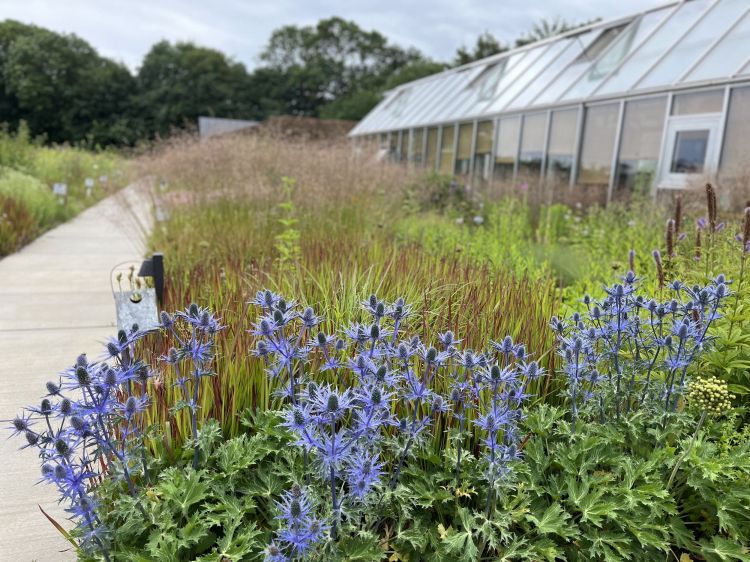
The wild light at Noma, summer version
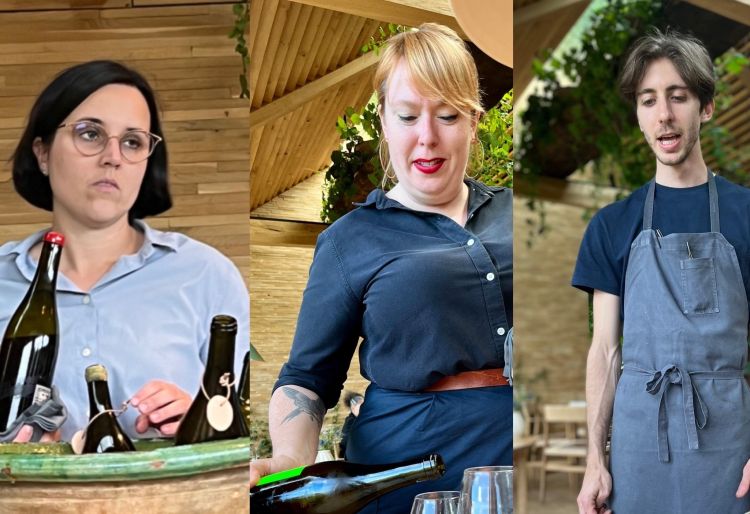
Left to right, restaurant manager Annegret Kühnert, head sommelier Ava Mees List and Italian chef de partie Luca Invernizzi
Noma in Copenhagen, the most influential restaurant of the last decade, had started to wonder what needed be done to become not the best restaurant in the world, but «the restaurant in which you can feel the best in the world» in February 2018, when they moved to the new, current location. A goal widely announced in the previous years at MAD, a successful foodcamp that had among its speakers not cooks or restaurateurs, but philosophers, economists, activists, psychologists, or artists with a precise «social conscience». They were all trying, in their own way «to shorten the distance between the current restaurant scene and the one we would like».
Four years later we’re back at Noma in the middle of the post-pandemic debate. The global restaurant industry is affected by lack of personnel and the public opinion is biasedly against exploiting restaurateurs and slacker young people. A hysterical and all in all sterile Manicheism, because it favours sensationalism to the research of possible solutions. But not the intentions of Rene Redzepi, who recently wrote on Instagram, «that big changes are happening. We’ve been laying some new foundational stones so we can continue to grow as an organization for the next 20 years».
In a luminous dinner early in July we talked with the team trying to guess the most important elements of this change. We got 3:
1- Noma will offer the last vegetarian menu on the first of October 2022.
2- In the following months, Redzepi will open a pop-up for two months in the East (if the pandemic allows). It would be the fourth after the adventures in Tokyo, Sydney and Tulum.
3- When Copenhagen will open again, in February 2023, all the interns will be given a salary and their contracts won’t last like the blink of an eye (3 weeks) but at least 6 months.
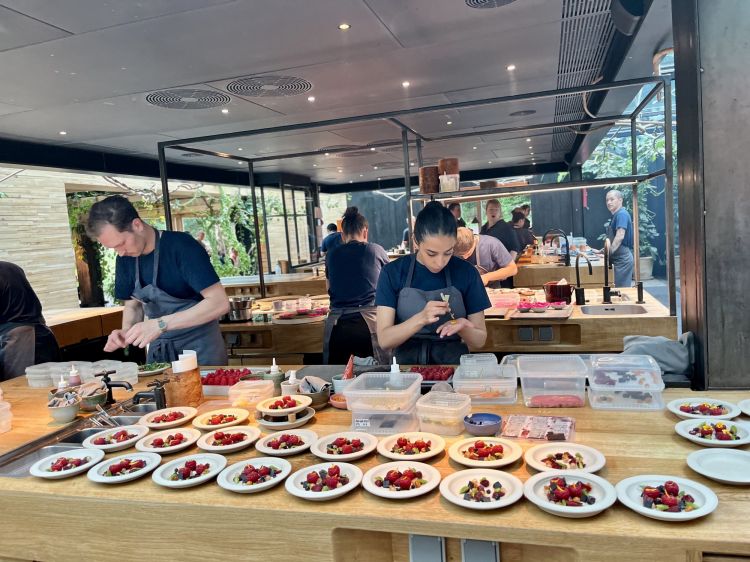
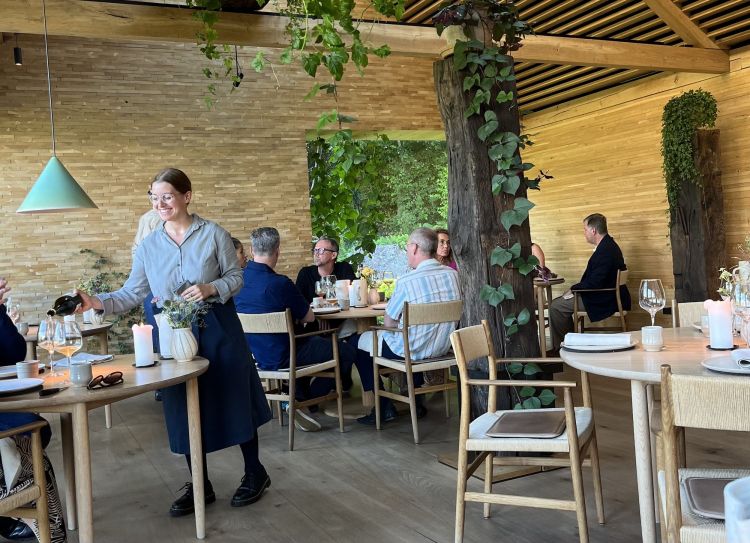
Noma now can host 80 guests per service, divided into 3 rooms
The latter is the most relevant news for a restaurant that, over the years, has had up to 37 interns at the same time – and never paid. An important improvement because it responds to criticism with a move that is not, as most people criticize, the result of the current compulsive criticism, but of considerations that have been made for some time. Something not requested, in fact: how many people would queue to come to experience, even for free, the ferment of the most influential restaurant in the world? Many, we can assure you.
«Since I’ve been here»,
Luca Invernizzi, 25-year-old chef de partie from Milan, at Noma since almost one year ago confirms the positive approach, «what has struck me the most wasn’t the incredible technique but the way in which the team is treated. Those who leave temporarily for a personal emergency know they will find their place when they’re back. This never happens elsewhere».
We’re at the start of a journey that will redefine human hierarchies and priorities. In the meantime, here are the images of the current vegetarian menu. Galactic in terms of concept and flavours. We will soon return to give more details on the cooking at Noma, a restaurant that in 2023 will celebrate its 20
th anniversary. A restaurant which, whether we like it or not, will continue to have a huge impact on the future of global cuisine.
NOMA, VEGETARIAN SEASON, summer 2022
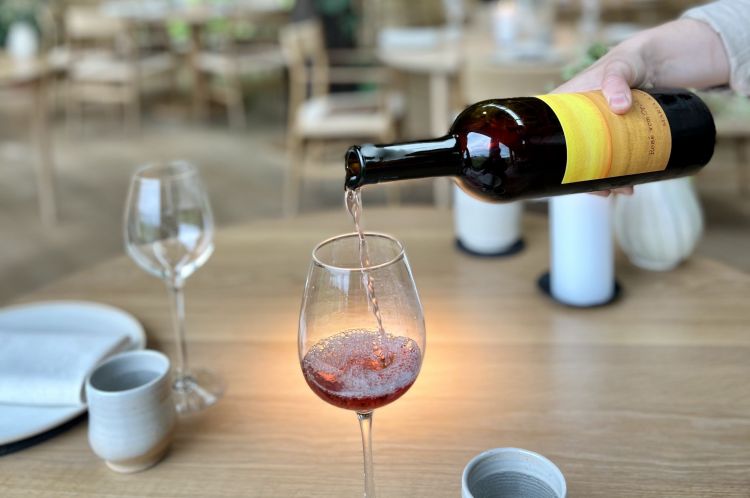
The first glass of our pairing is a Rosé vom Opok 2020 from Maria and Sepp Muster, Lautschach (Styria, Austria)
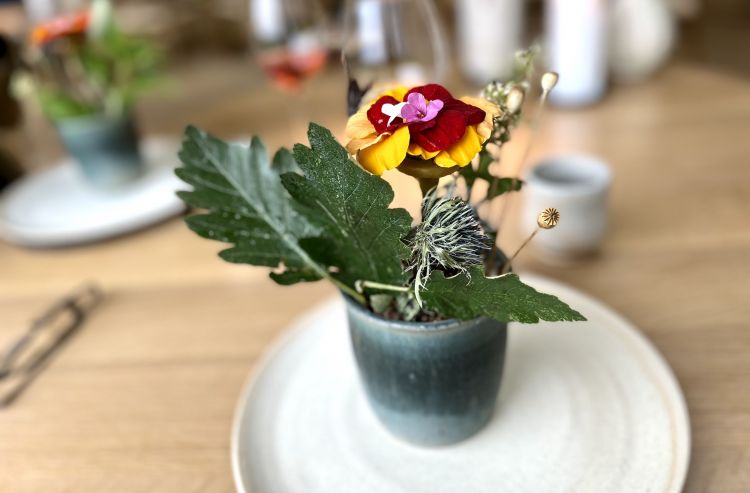
Flower tart
The first tasting from the menu is an emblem dish at Noma, interpreted in endless variations over the years. Hidden among the flower petals there’s a crispy tart of potatoes with a leaf of nasturtium seasoned with parsley oil. The 2022 summer menu is completely vegetal, satisfying and succulent, a goal that the test kitchen never misses, and on which we will return soon. To contribute to the deliciousness there are sauces, butters, dairy products and the usual umami contribution of fermentation
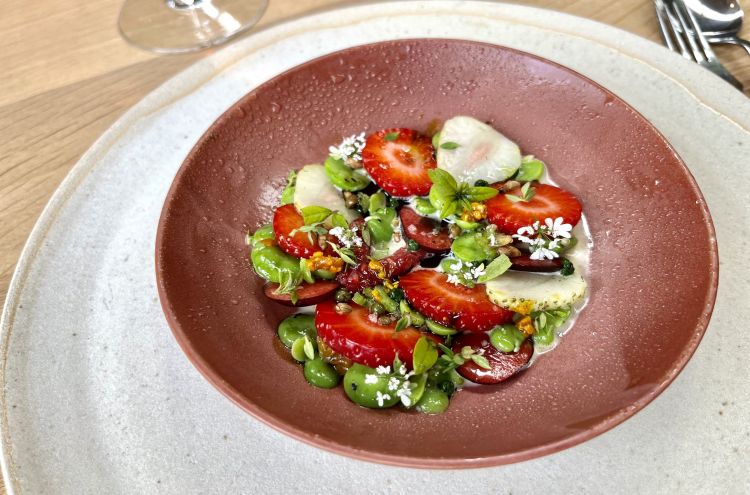
Summer salad
A summer salad of barbecued broad beans, raspberries, cherries, green and red strawberries... The seasoning: sauce of fermented tomato water, coriander seeds and blackcurrants. You mix it and savour it, with fork or spoon. Taste and freshness
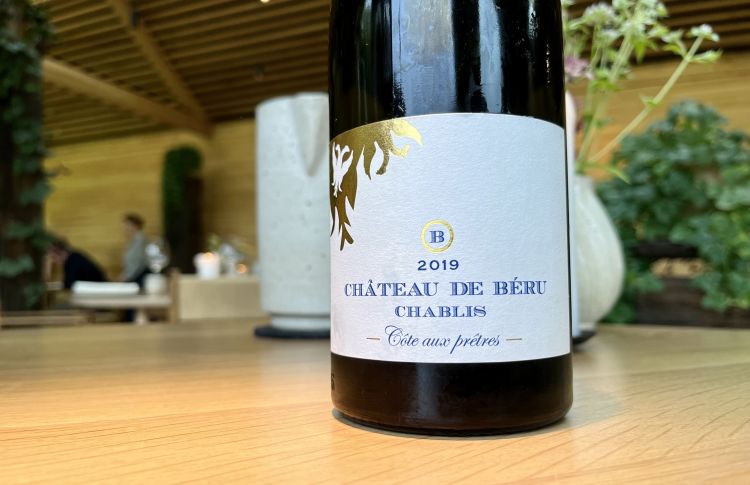
Pairing #2: Chablis Cote aux Prétres 2019, Athénais de Béru, Béru (Bourgogne, France)
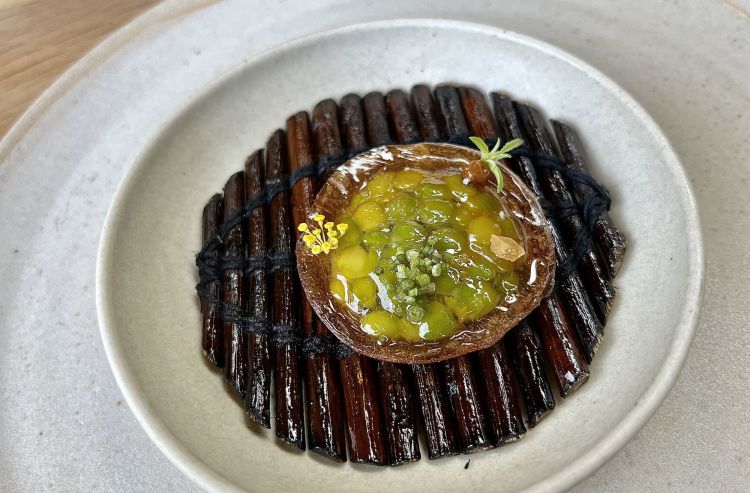
Pea and white currant dumpling
Ravioli of an elastic-gelatinous texture made of two leaves of white currants reduced in a juice in the oven to keep the sugars. It encloses a salad of peas seasoned with their juice. On top, flowers of fennel and tips of verbena. Eat with your hands. A special off the menu
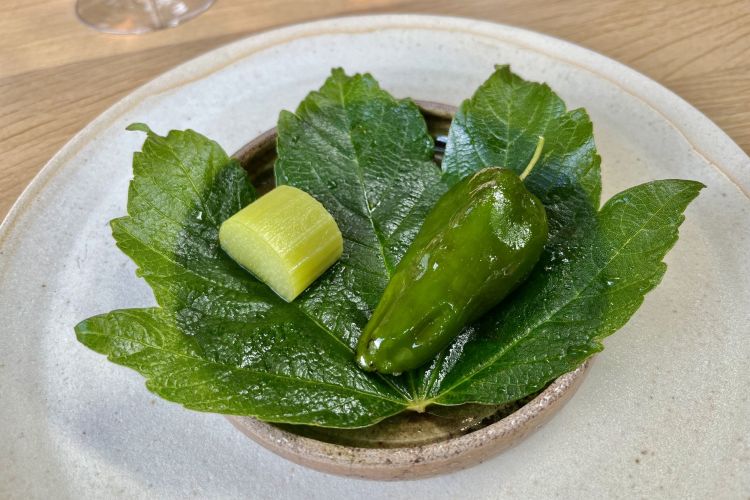
Grilled padròn pepper
The edible part is on the right: it’s a green pepper cooked on the barbecue, emptied and filled with a salad of baby cucumbers and green strawberries, sunflower seeds aromatised with a paste of oil and slightly spicy chile morita. To the left, a very watery slice of green rhubarb, in brine, a technique usually used for meat. You don’t eat it but squeeze it on the green pepper before tasting it, as if it were a slice of lemon
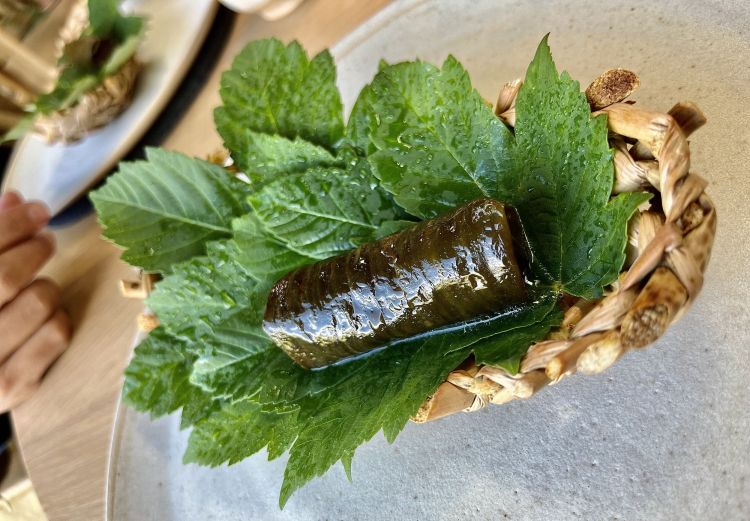
Cucumber skin dolma
A tart of koji grilled with a paste of pumpkin seeds, enclosed in a leaf of cucumber in the shape of a dolma. The Turkish-Greek-Middle Eastern-Caucasian custom of enclosing food (minced meat, or rice or wheat) in a leaf (usually of vine)
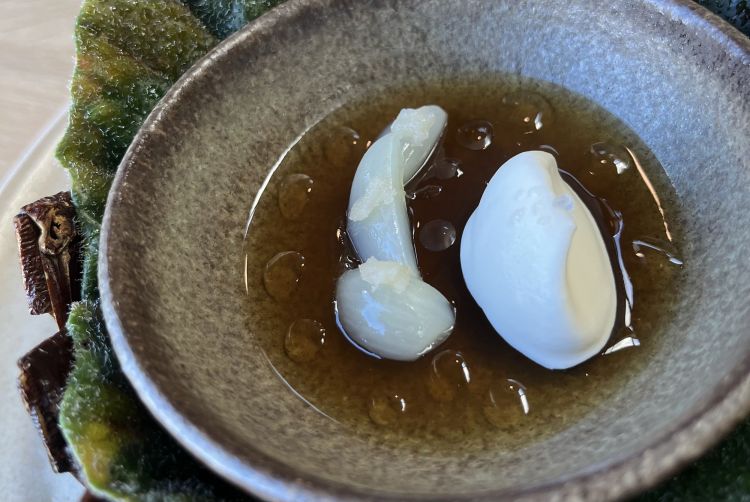
New season garlic and onion
A gelatine of mushroom broth and onion on which, to the left, is placed some young, blanched garlic, cut and seasoned with oil of red fir and plum stone. The quenelle to the left is whipped cream
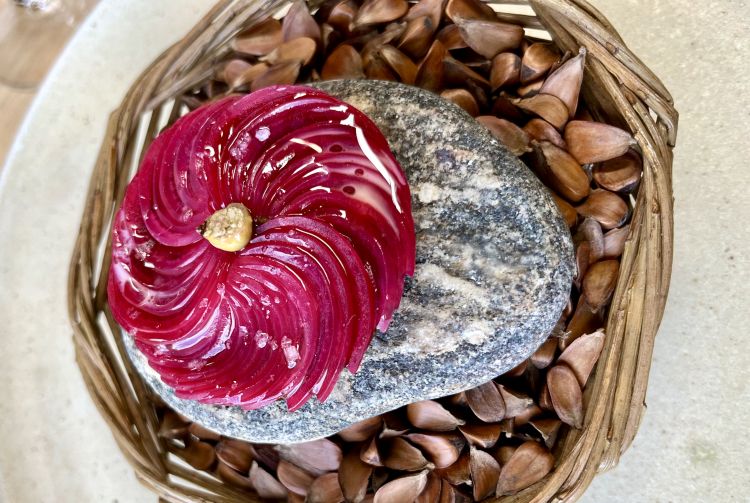
Radish pie
A radish pie which once again you must eat with your hands. There’s roasted kelp seaweed in the pastry. The cream is made with an emulsion of butter and a reduction of piso (pea miso) and turmeric. Garnishing: slices of radish cut very thinly and cooked in osmosis in radish juice. The green spot on the top is a small hat of blackcurrants. All seasoned with oil and radish juice
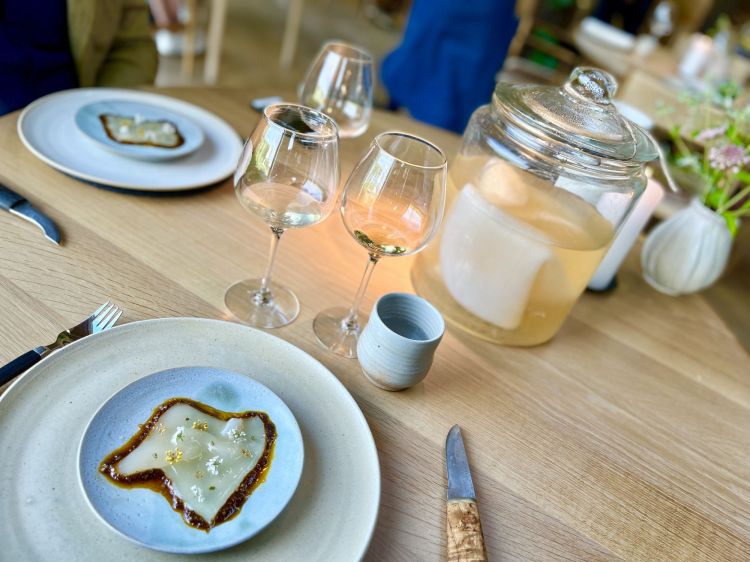
Scoby steak and smoked pumpkin
The "steak" of scoby (which stands for symbiotic culture of bacteria and yeast), that is to say the jelly starter of a jasmine kombucha, is served with an XO, non-hot, sauce, with dehydrated tomato seeds in koji oil. The challenge at Noma was to make scoby palatable, as usually it would have the flavour and the texture of a piece of paper. After many attempts, they found the way: they use an enzyme called cellulase, which generates a lovely texture, similar to raw squid
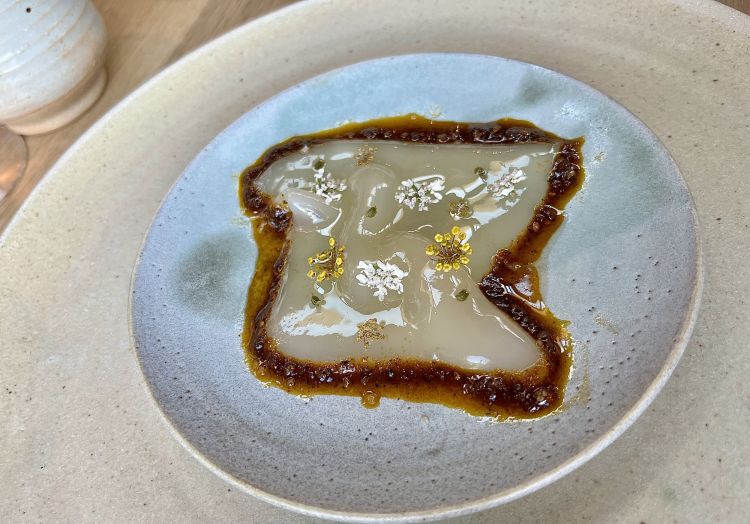
On the surface of the scoby, fennel flowers, seeds and coriander flowers
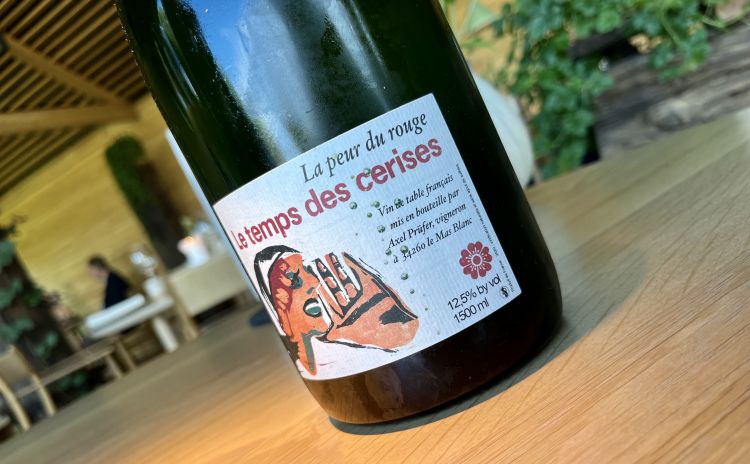
Pairing #5: La peur du rouge Pet-nat 2020, Axel Prüfer, La Tour-sur-Orb (Occitan, France)
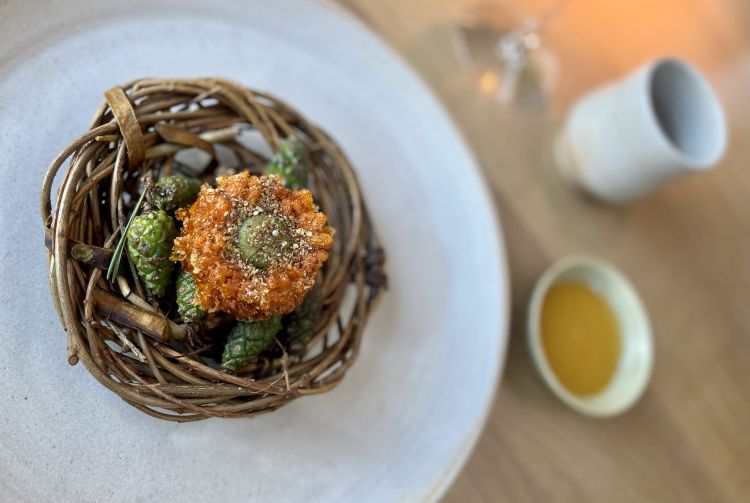
Marigold tempura
Calendula in tempura with a small plate with a sauce of egg yolk and whisky
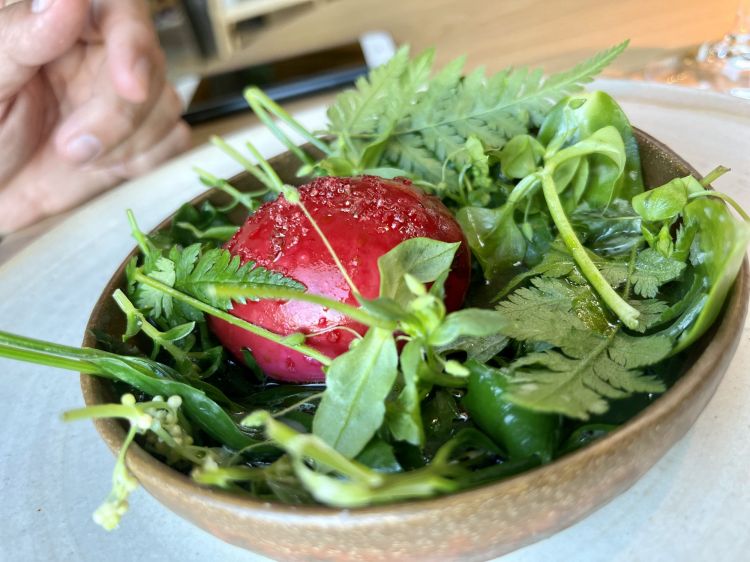
Fresh egg cooked with beets and ramson
Marinated soft-boiled egg in beetroot liquid, cooked in an emulsion of butter and fermented tomato water and garnished with wild herbs. On the base there’s a sauce of wild garlic
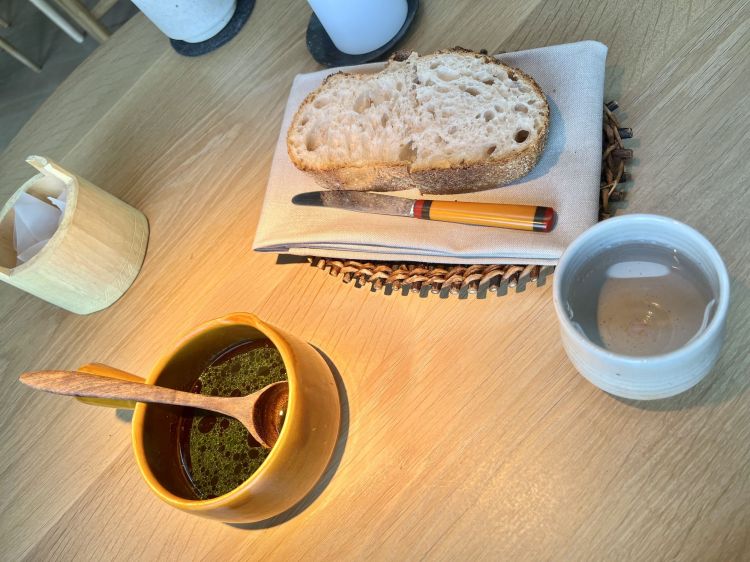
Italian clients will miss some bread to scoop the sauce. No worries. After we asked, we were brought the magnificent bread of Hart Bageri with a sauce of wild garlic from the previous dish and butter
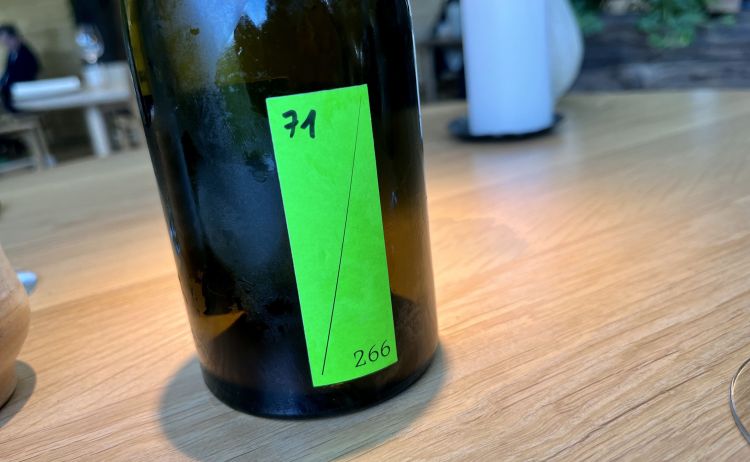
Pairing #6: 266 2019, Thomas Puéchavy, Nazelles-Négron (Loire, France)
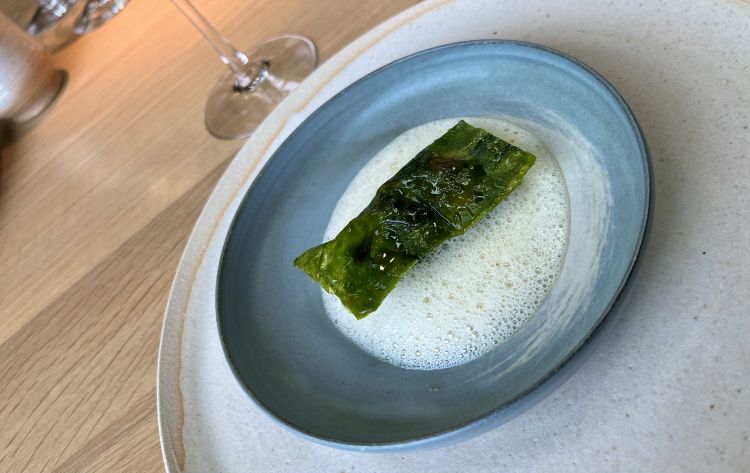
Potato wrapped in sea lettuce
Under the layer of rehydrated sea lettuce, there’s a fried potato dumpling, glazed with an emulsion of koji and piso. Around, a foam of tomato water with a small touch of parsley
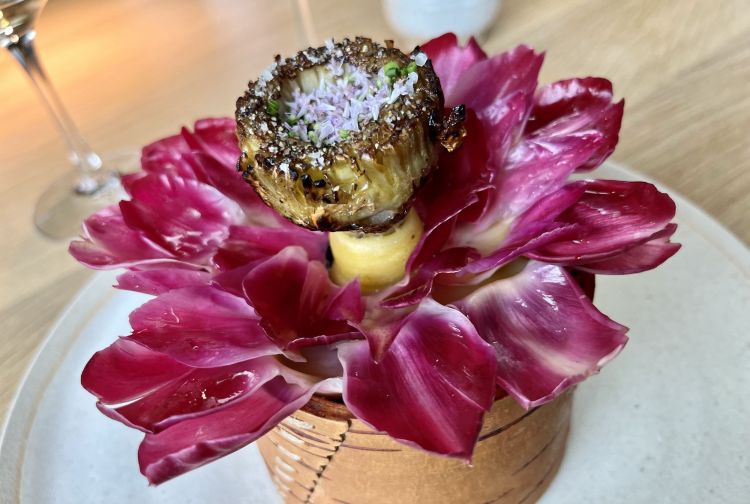
Grilled young artichoke
Crispy artichoke cooked in butter and then barbecued. Inside there’s a whisky sauce. Seasoned with thyme flowers and salt flowers
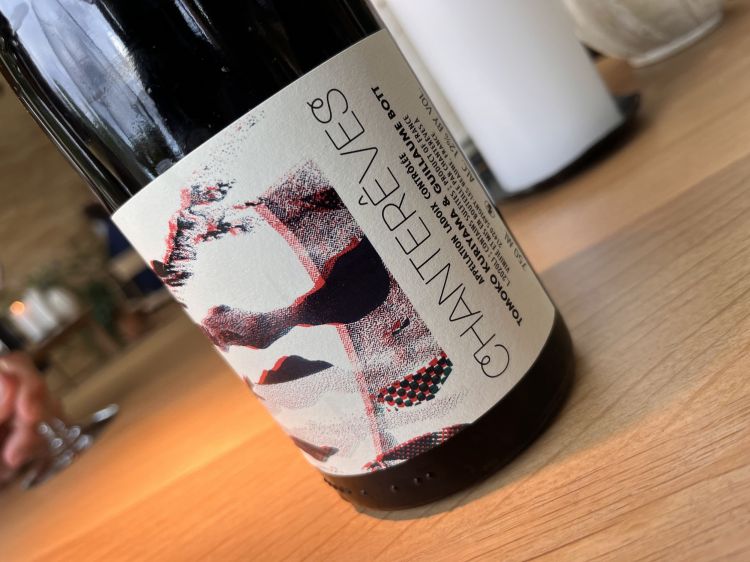
Pairing #7: Ladoix Les Joyeuses 2020, T Kuriyama & G Bott, Savigny-lès-Beaune, (Bourgogne, France)
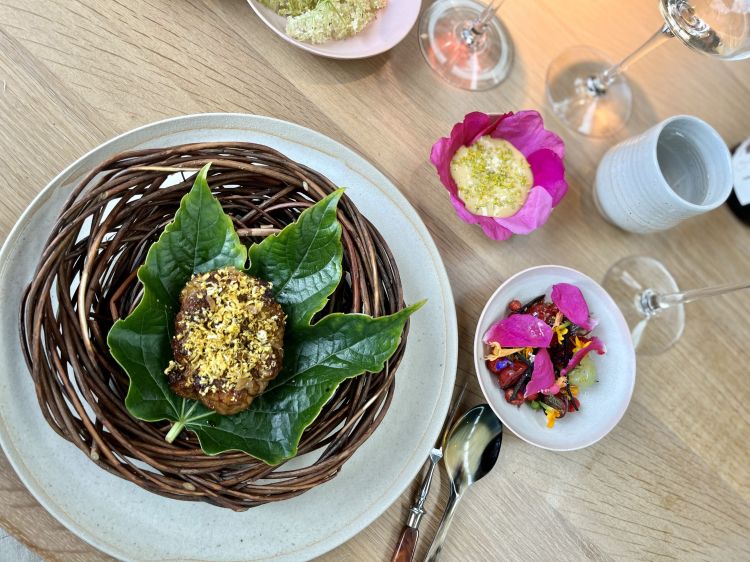
Lion's mane mushroom roasted with wild roses
The “main” course is a very satisfying lion's mane mushroom, used also for medical reasons, typical for its long white mane. It’s served in slices with flakes of pumpkin bushi, cooked in the oven with koji oil, pressed, and barbecued. On the side we have: in the bottom right corner, a fruit salad (wild strawberries, green and red gooseberries) with rose petals; in the middle a rose with bearnaise sauce made with an emulsion of butter, rose oil, and finished with fennel pollen. Further up, some elderberry flowers

Pairing #7: Rosé d'un Jour 2020, Mark & Martial Angelì, Thouarcé (Loire, France)
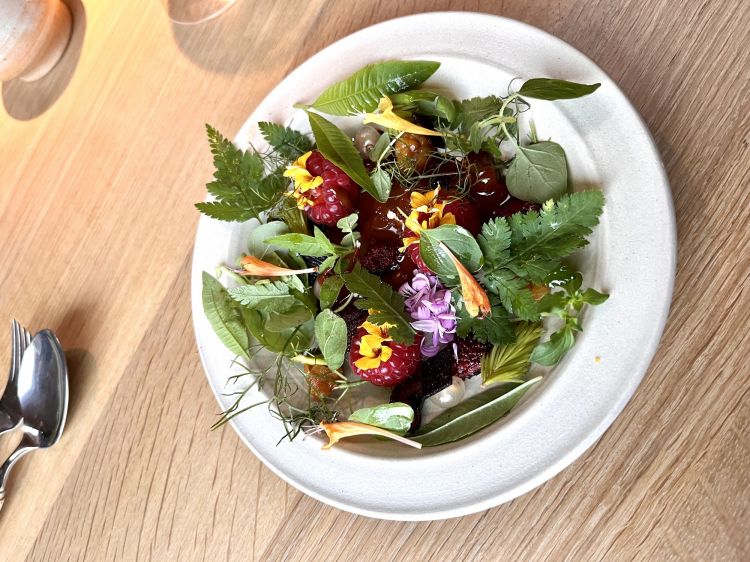
Chocolate herb salad
Fruit salad with chocolate. The chocolate and caramel sauce, garnished with herbs from the property’s greenhouse (verbena, basil, white currants, raspberries...)
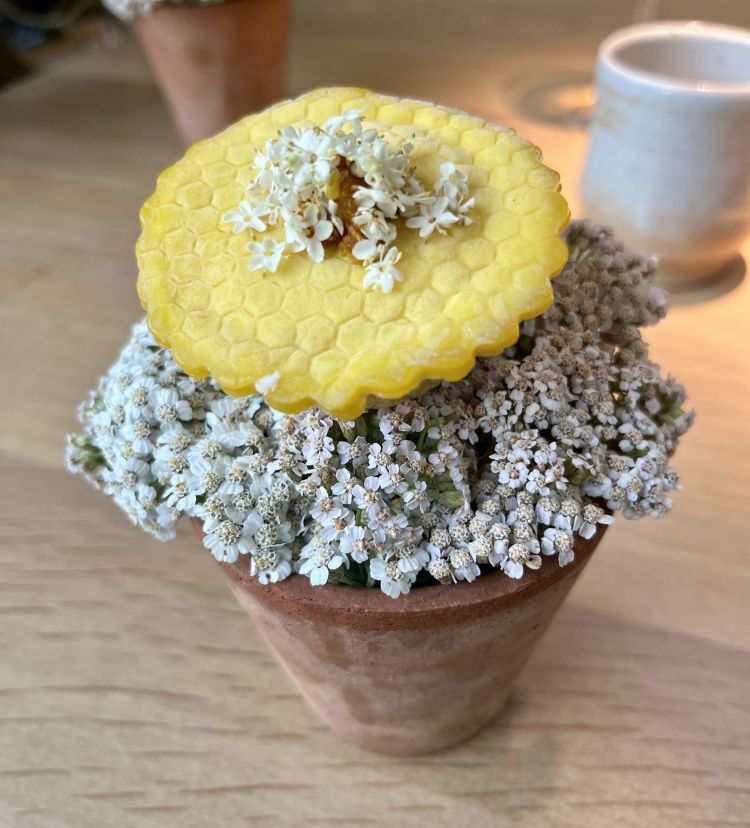
Oatmeal and honey
Elderberry and honey gelato wrapped in oatmeal. Served too cold to be fully appreciated
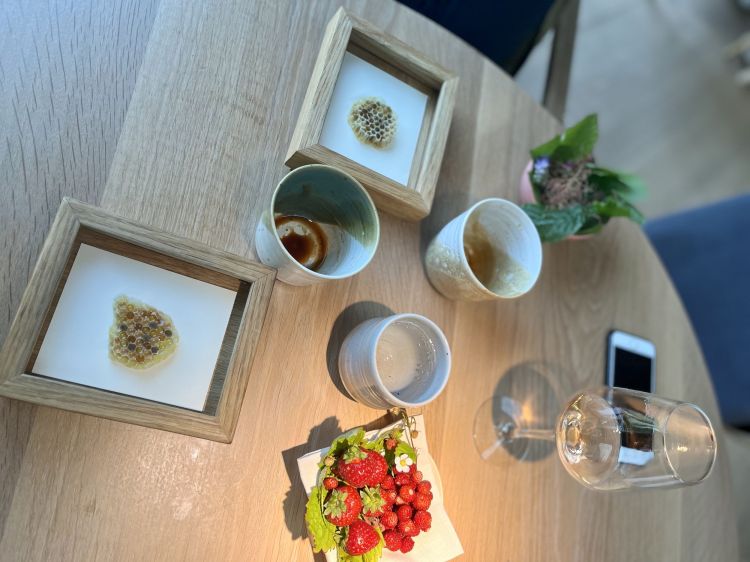
Marinated honeycomb
At 6 o’clock, strawberries and wild strawberries; at 9, from the hive, which must not be eaten, but you can suck the honey and oil of black currants seasoned with salt

In the garden at Noma. In the background, the Copenhill incinerator is fuming. The vegetable season menu is 3’000 Danish crowns (400 euros); the wine pairing is 1’800 (240 euros). There’s also the juice pairing option (135 euro)
Translated into English by Slawka G. Scarsa